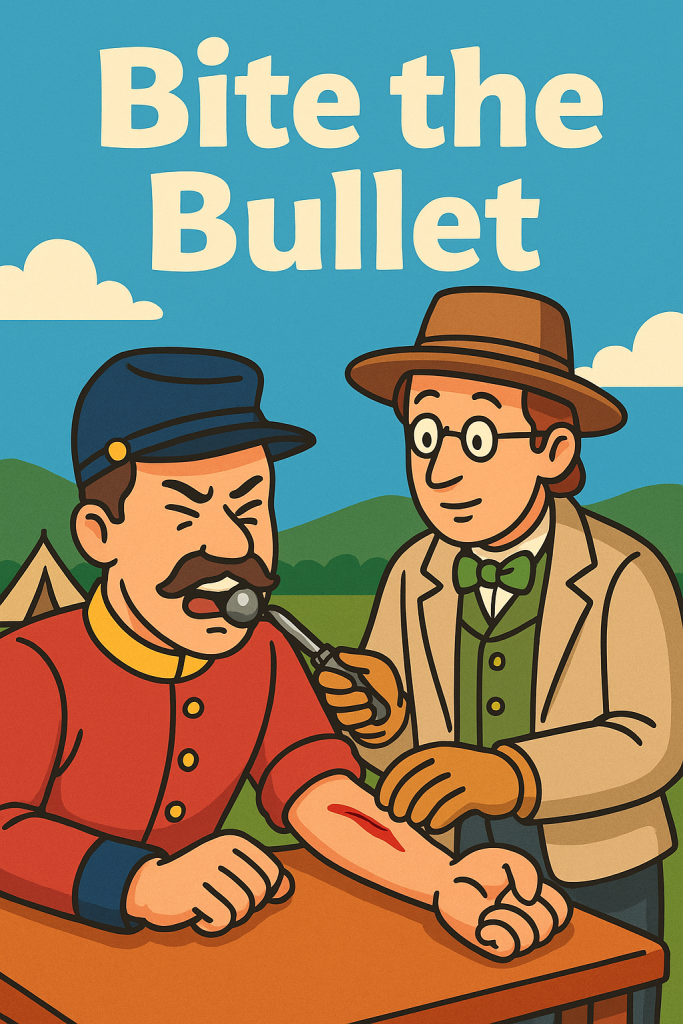Some phrases in English have such a punch to them that they instantly conjure up grit, toughness, and endurance. “Bite the bullet” is one of those. It’s a phrase I’ve heard on rugby pitches, in committee meetings, and in business circles — and it always means the same thing: face up to something unpleasant and get on with it.
But where did this vivid expression come from, and why do we still use it today?
A painful beginning
The most widely accepted origin of “bite the bullet” goes back to the battlefield and the operating table.
Before the development of reliable anaesthetics in the mid-19th century, surgery was brutal. Amputations, wound cleaning, even dental extractions were done with little more than brandy or opium for pain relief. Soldiers would literally be given a bullet to bite down on to help endure the agony.
It sounds barbaric, but biting on something hard can actually help the body manage pain and stop the patient from crying out or thrashing around. In the chaos of a battlefield tent, a musket ball was often the most available tool.
Thus, “to bite the bullet” became shorthand for enduring pain with courage.
From battlefield to everyday life
The phrase entered English literature in the 18th century. Rudyard Kipling used it in his 1891 novel The Light That Failed:
“Bite on the bullet, old man, and don’t let them think you’re afraid.”
From there it spread quickly into everyday speech, especially in military contexts, and later into politics and business. By the 20th century, “bite the bullet” was no longer about physical pain but about enduring hardship or making tough decisions without complaint.
What it means today
When we say someone has to “bite the bullet,” we mean:
-
Face an unpleasant situation head-on.
-
Do something difficult but necessary.
-
Stop delaying and take the pain now to move forward later.
It’s the verbal equivalent of bracing yourself, rolling up your sleeves, and getting on with it.
Personal encounters with the bullet
I’ve had a few moments in life where I’ve had to “bite the bullet”:
-
Dentistry: Some treatments are unpleasant for patients despite all the skill in the world. I’d explain kindly, reassure them, and sometimes hear them mutter, “I’ll just have to bite the bullet.” They didn’t literally, of course, but it shows how deeply the phrase has entered our vocabulary.
-
Sport: Playing cricket with a cracked finger, strapping it up and going out to bat because the team needed me. Not wise, perhaps, but definitely bullet-biting.
-
Online marketing: Facing up to sunk costs. I once spent far too much on ads that didn’t convert. The hardest part wasn’t the money lost, but admitting I had to stop. That was my business version of biting the bullet.
Why the phrase works so well
The metaphor is powerful because it connects three ideas:
-
Pain: The bullet in your mouth represents unavoidable discomfort.
-
Courage: The act of biting shows you’re not giving in to fear.
-
Action: It’s not passive suffering; it’s active endurance for a purpose.
This combination makes the phrase timeless. We all have “bullets” in our lives — tough jobs, awkward conversations, uncomfortable truths. And we all know the moment where we just have to clench our teeth and get through it.
Close cousins
“Bite the bullet” has a few linguistic relatives:
-
“Grin and bear it.” Endure something with good humour.
-
“Take it on the chin.” Another phrase borrowed from physical pain, boxing this time.
-
“Face the music.” A slightly different twist — accepting consequences rather than enduring pain.
Each has its place, but “bite the bullet” remains the grittiest.
A lesson for online business
Affiliate marketing and product creation are full of tempting shortcuts, but sometimes the real progress comes when you bite the bullet.
-
Writing that awkward first email to your list.
-
Scrapping a funnel that doesn’t work and starting again.
-
Learning a tool properly instead of half-using it.
These are the bullets we all face. The faster we bite down, the faster we move forward.
Final thought
Next time you hear someone say “bite the bullet,” remember the soldiers and patients who literally did so. Then remember that most of our “bullets” are far less painful — but the courage required is just as real.
So whether you’re facing a tough choice, a backlog of emails, or even your first product launch, sometimes you just have to grit your teeth, bite the bullet, and get it done.



